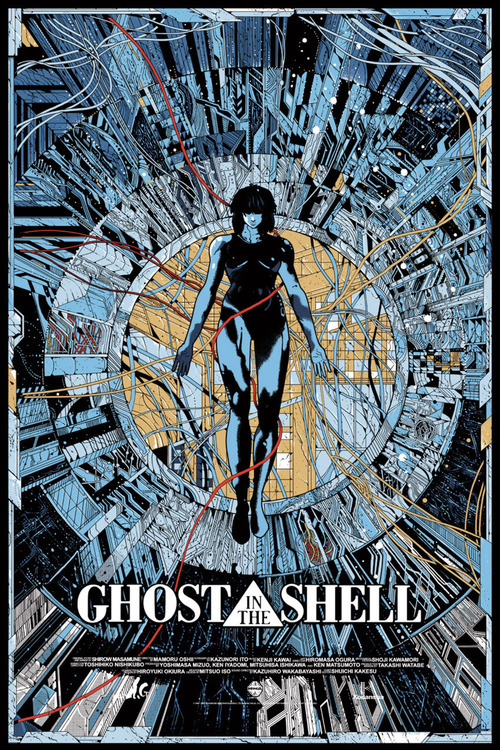
Well, here we are; my first major review of an anime...
outside of my review of the first season of Pokémon
and the two ‘Strange Moments’ posts that I did about the show (spoilers:
maybe a third one in the future; stay tuned!). I’ll admit that I usually don’t
watch a lot of anime because simply put,
it’s just not really my thing. Like I said, my experience with the genre almost
entirely comes through Pokémon. For
the record, though, it’s easy to see why this genre has been so popular with
film fans. Franchises like Cowboy Bebop,
Akira, and Dragon Ball Z have attracted considerable fanbases over the years and quite a few of these franchises are
still going strong today. Some of these anime series were based off manga
series, the Japanese form of comics, and arguably one of the most famous manga
series of all-time is Ghost in the Shell,
created by Masamune Shirow. A new live-action film adaptation of the series,
starring Scarlett Johansson in the lead role of cybernetic policewoman ‘The
Major’, is set to come out this weekend. But before that, I wanted to check out
the original animated film that started it all. Released in 1995, Ghost in the Shell was a big critical
and commercial success when it was first released in Japan. It came to the U.S.
during a time when anime was slowly starting to enter the mainstream media, a
period that many refer to as the ‘Japanimation’ era of anime. It ultimately
proved to be quite an influential film for many filmmakers, perhaps most
notably the Wachowskis as evident from their iconic 1999 effort, The Matrix. In other words, this is
generally regarded as one of the greatest anime films of all-time and after
seeing it for the first time, I can see where many of those critics are coming
from.
In the year 2029, society is connected to one large
planetary network that humanity accesses via a series of cybernetic bodies
known as ‘shells’ that contain their consciousness AKA ‘ghost’, hence the title
Ghost in the Shell. One of these
beings is Major Motoko Kusanagi (Mimi Woods), who leads an assault team known
as Sector 9 that is tasked with dealing with crimes that are tied to the global
network. This leads to them going on the hunt for a mysterious hacker known as
the ‘Puppet Master’ (Tom Wyner). What follows is a deeply-layered story that
explores the divide between humanity and technology along with the definition
of one’s identity. The latter is particularly relevant in the characterization
of Motoko and her struggle to connect with humanity (e.g. never paying mind to
her sexual appearance whenever she unrobes to reveal her skin-tight thermoptic suit). Now, admittedly, this means
that the story may end up being a bit too complex for some audiences. Even I’ll
admit that, in some ways, I’m one of those people; it’d probably take me a few
more viewings to fully grasp all the deep themes within this story that pose
questions that lead to vague answers. However, as a casual viewer (and someone who
isn’t very familiar with anime), I did find the overall plot to be very
engrossing and well-paced at a brisk 82-minute runtime. Another great thing
about the film is its animation. It’s an effective mix of traditional animation
and CG animation that results in some very striking visuals, from the film’s
terrific action sequences to subtle touches like the fact that Motoko rarely
blinks, keeping in line with her characterization as a cyborg. In short, the
original Ghost in the Shell is a thought-provoking,
mature, and all-around stylish sci-fi action film that clearly still stands as
one of the most definitive films of its genre. And while the writing can be
complex at times, I can see why some say that this is one of the better films
to start with for those who are new to anime.
Rating: 4/5
No comments:
Post a Comment